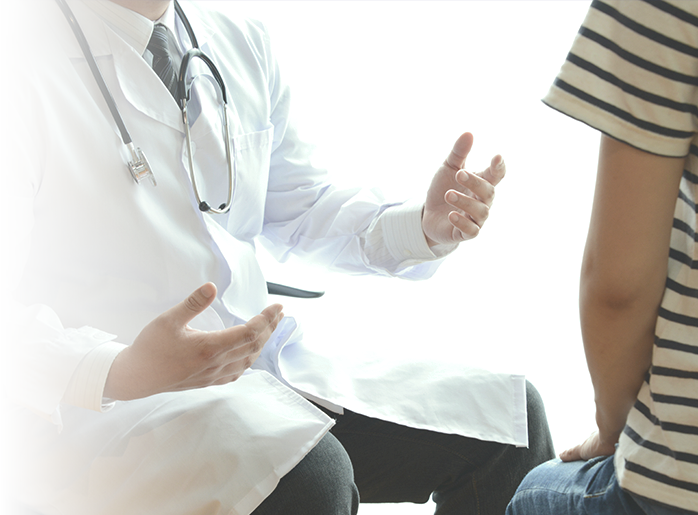Sexually Transmitted Infections
Know More: Sexually Transmitted Infections
Trustworthy information, straight from the source. Education is the first step in an empowering healthcare plan. Learn more about sexually transmitted infections from prevention to diagnosis and treatment.

Risk Prevention
What are sexually transmitted infections?
More than 30 different bacteria, viruses and parasites are known to be transmitted through sexual contact. Eight of these pathogens are linked to the greatest incidence of sexually transmitted disease.
Of these eight infections, four are currently curable:
- Syphilis.
- Gonorrhea.
- Chlamydia.
- Trichomoniasis.
The other four are viral infections and are incurable:
- Hepatitis B.
- Herpes simplex virus (HSV or herpes).
- HIV.
- Human papillomavirus (HPV).
Symptoms or disease due to the incurable viral infections can be reduced or modified through treatment.
What are the causes of sexually transmitted infections?
Sexually transmitted infections (STI) are spread predominantly by sexual contact, including vaginal, anal and oral sex. Some STIs can also be spread through non-sexual means such as via blood or blood products. Many STIs—including chlamydia, gonorrhea, primarily hepatitis B, HIV, and syphilis—can also be transmitted from mother to child during pregnancy and childbirth.
A person can have an STI without having obvious symptoms of disease. Common symptoms of STIs include vaginal discharge, urethral discharge or burning in men, genital ulcers, and abdominal pain.
How are sexually transmitted infections prevented?
- Counseling and behavioral interventions: Counseling and behavioral interventions offer primary prevention against STIs (including HIV), as well as against unintended pregnancies. These include:
- Comprehensive sexuality education, STI and HIV pre- and post-test counseling.
- Safer sex/risk-reduction counseling, condom promotion.
- Interventions targeted at key populations, such as sex workers, men who have sex with men and people who inject drugs.
- Education and counseling tailored to the needs of adolescents.
- Barrier methods: When used correctly and consistently, condoms offer one of the most effective methods of protection against STIs, including HIV. Female condoms are effective and safe, but are not used as widely as male condoms.
Diagnosis & Treatment Options
How are sexually transmitted infections diagnosed?
- Blood tests: Blood tests can confirm the diagnosis of HIV or later stages of syphilis.
- Urine samples: Some STIs can be confirmed with a urine sample.
- Fluid samples: If you have active genital sores, testing fluid and samples from the sores may be done to diagnose the type of infection.
- Laboratory tests: Testing material from a genital sore or discharge are used to diagnose some STIs.
How are sexually transmitted infections treated?
Effective treatment is currently available for several STIs:
- Three bacterial STIs (chlamydia, gonorrhea and syphilis) and one parasitic STI (trichomoniasis) are generally curable with existing, effective single-dose regimens of antibiotics.
- For herpes and HIV, the most effective medications available are antivirals that can modulate the course of the disease, though they cannot cure the disease.
- For hepatitis B, immune system modulators (interferon) and antiviral medications can help to fight the virus and slow damage to the liver.
Resistance of STIs—in particular gonorrhea—to antibiotics has increased rapidly in recent years and has reduced treatment options. The emergence of decreased susceptibility of gonorrhea to the “last line” treatment option (oral and injectable cephalosporins) together with antimicrobial resistance already shown to penicillins, sulphonamides, tetracyclines, quinolones and macrolides make gonorrhea a multidrug-resistant organism. Antimicrobial resistance for other STIs, though less common, also exists, making prevention and prompt treatment critical.
Preparing for Care
When should I contact my healthcare provider?
If your sexual history and current signs and symptoms suggest that you have an STI, laboratory tests can identify the cause and detect coinfections you might have contracted.
We offer STD Screenings at all of our primary care clinic locations.
Providers at North Memorial Health’s Infectious Disease Clinic diagnose and manage sexually transmitted diseases (STDs):
- Chlamydia.
- Human Papillomavirus (HPV).
- Gonorrhea.
- Syphilis.
- Herpes.
- Many other STDs.
